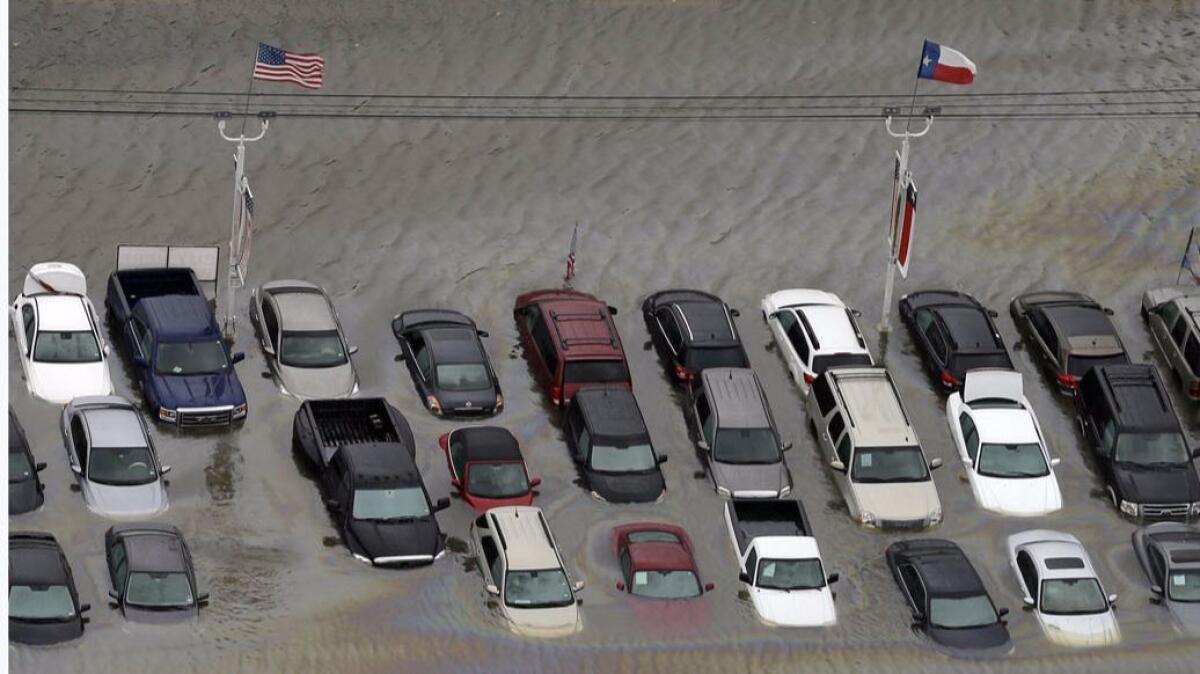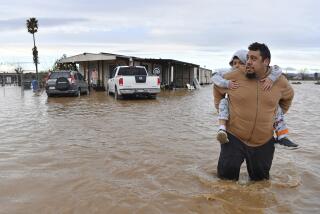Hurricane destruction expected to boost auto sales

The rise in Harvey-related insurance claims is expected to boost vehicle sales in Texas.
Floodwaters in and around Houston severely damaged or destroyed hundreds of thousands of cars and trucks, most of which will be replaced. Those new and used vehicle sales will benefit automakers and the economy, providing a glint of silver lining amid terrible tragedy.
The storm “is the worst in terms of vehicle damage in history,” said Jonathan Smoke, chief economist at Cox Automotive.
Between 300,000 and 500,000 passenger vehicles were destroyed or damaged in the Houston metropolitan area alone, Smoke said; translated into dollars, that’s between $2.7 billion and $4.9 billion.
Figures did not include vehicles on Houston-area dealer lots, which are now being assessed.
Harvey did more vehicle damage than Hurricane Katrina in 2005, Smoke said, because Houston’s population is much larger than that of New Orleans, and worse than Superstorm Sandy in 2012 because flooding from Harvey is more widespread.
After a natural disaster, automobile sales snap back fast. A month after Sandy hit, New York City-area vehicle sales jumped 49%.
Replacement sales will affect both new and used cars. Between 60% and 70% will be used cars, Smoke estimated. Some cars will not be replaced, but the number will be relatively small, he said.
Automakers released nationwide auto sales figures for August on Friday. Hurricane Harvey took a toll on new vehicle sales as Texas residents coped with disaster, but that could reverse itself soon as people with flood-damaged cars buy new ones.
U.S. auto sales initially were expected to increase slightly in August compared with a year ago, but analysts say lower sales in the Houston area could erase those gains. Harvey likely cut U.S. sales of new cars and trucks by 1.3%, or 20,000 vehicles, in August, forecasting firm LMC Automotive said. The Houston metro area is the ninth-largest vehicle market in the nation.

Meantime, August was a healthy month for General Motors and Toyota.
After four straight monthly declines, General Motors sales shot up 7.5% compared with August last year. Fleet sales to corporations, government agencies and rental car companies helped, but GM also “really knocked it out of the park with sport utility vehicles and crossovers,” said Michelle Krebs, analyst at Autotrader.
That bodes well for the company’s near-term future, said Krebs, with four new GM models in those categories coming in the new model year this fall. “Those couldn’t be more perfectly timed,” she said.
Toyota sales rose 6.8%, largely on the strength of its RAV4 crossover, which is drubbing competitors from Honda, Ford, GM and others.
“The RAV4 sold a dazzling 43,000 units,” Krebs said, adding that she believes Toyota intends to make the RAV4, not the Camry, the industry’s bestselling non-truck as consumers shift to crossovers and SUVs from sedans and other traditional car models.
Volkswagen sales were up 5.5%. Honda’s were near-flat, down 0.5%.
But the month was bad for Ford, worse for Fiat-Chrysler and grim for Nissan. Ford said its sales fell 2.1%, Fiat-Chrysler 7.7% and Nissan 13.1%.
U.S. passenger vehicle sales overall are expected to fall a few hundred thousand in 2017 from last year’s record high of 17.5 million.
Twitter: @russ1mitchell
The Associated Press contributed to this report.
UPDATES:
11:50 a.m.: This article was updated to include comment from Jonathan Smoke, chief economist at Cox Automotive.
10 a.m.: This article was updated with new information on auto damage in the Houston area.
This article was originally published at 7 a.m.
More to Read
Inside the business of entertainment
The Wide Shot brings you news, analysis and insights on everything from streaming wars to production — and what it all means for the future.
You may occasionally receive promotional content from the Los Angeles Times.











